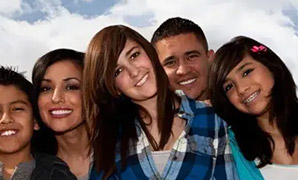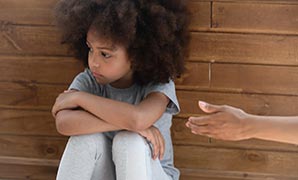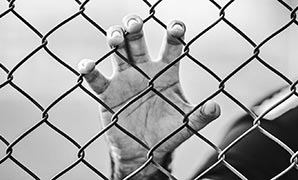VA Foster Care by the Numbers
The 2023 AFCARS Report shows around 20,000 young people leave the foster care program without an adoptive family. The industry refers to responsible parent figures and a place to call home as "permanency." Achieving permanency for children through adoptive or foster families is vital for long-term mental health and stability. It can significantly affect whether children in our child welfare system graduate high school, find a good job, or attend college.
In our community, many youth in foster care struggle after they age out of the system without an adoptive family or social support structure. Without family members to guide and support them, children and youth often struggle to find their way. Data shows that foster kids who spend time in family foster homes fare better than those in more institutional group care settings. Nowhere is this more true than when eligible foster kids find forever families through foster-to-adoption.
The mean age of a child in foster care is just eight years old. In Virginia, nearly 5,000 children are in foster care. Many foster kids cannot return to their birth families. More than 1,700 Virginia foster children, including babies, kids, and teens, are eligible for adoption.
Families who are willing to help foster youth truly change lives. Foster-to-adopt parents provide permanent homes and loving forever families for foster children across the United States. Foster parents make a huge impact during their short time with foster kids. Each provides a temporary stable home and refuge until their foster children reunite with their biological families. All play a crucial role in improving the lives of children in foster care.
The number of children in foster care has decreased in recent years. However, there are still more foster kids eligible for adoption than there are adoptive families to care for them.
Foster youth need lots of support, both for stable, nurturing care...and often for coping with trauma in their young lives. Trauma could be from the abuse or neglect that caused them to enter the foster care system. The process of removing foster kids from their homes may itself cause trauma, as well. A significant number of kids in care even experience symptoms of PTSD. Trauma-informed care plays a strong role in training for foster and adoptive parents caring for kids in the foster system.
Looking forward, we need to continue working toward a protective system of care with more foster-to-adopt families. Only 3% of foster kids continue on to earn a college degree, which is much lower than the rate of non-foster college graduates. The magic ingredients are often a place to call home and a warm, supportive, and loving family. Parents who foster adoption complete their families and help their children succeed and achieve happiness in the long run.
The local Department of Social Services (DSS) system works hard to improve foster children's daily lives. These efforts include supportive services that help families in crisis while kids remain safely at home. Evolving challenges include opioid addiction among a large number of parents. Drug abuse continues to plague our communities and traumatize families.
Addiction often forces children to enter foster care feeling displaced, scared, and lonely. Addicted parents may try to get clean, but there is a high rate of relapse. This can cause instability and disruption for their children, who end up in and out of foster care.
AdoptionVA's mission is to proactively provide stable home and family opportunities for foster kids eligible for adoption. Working within the foster care system, our dedicated team focuses on earning state approval for foster-to-adopt parents. Virginia's children of all ages, races, and backgrounds need safe, stable, and loving families.
Thank you for considering foster care or adoption through the foster care system. We dedicate ourselves to connecting brighter futures for Virginia's foster children. We are here to help you get state approval and to support our foster-to-adopt parents every step of the way.
You can make a difference in the life of a foster child today and for all their tomorrows.
Children spend too long in the foster care system...
-
5,254
Children in Virginia's foster care system
-
1,690
Children awaiting adoption in Virginia
-
14%
Virginia foster children who spend 3-4 years in foster care
-
19
Average months that Virginia foster kids spend in the system
Why do children enter foster care in DSS custody?
What happens when Virginia kids age out of foster care without an adoptive family?
-
71% of foster girls are pregnant by age 21
Nearly 3/4 of girls who spend time in foster care get pregnant before they turn 21 years old.
-
20% of foster youth experience homelessness
For foster youth who aged out of care at 21 years, within two years, 20% have experienced homelessness. Without an adoptive family, they often have nowhere to turn. Too often, young adults exiting the foster care system have not finished high school when their top priority becomes housing and income.
-
43% have Post-Traumatic Stress Disorder (PTSD)
Professionals have diagnosed PTSD in 43% of children who spend time in the foster system – that’s twice the rate in U.S. veterans.
-
Only 49% graduate high school by age 19

Fewer than half of foster youth graduate high school by age 19. Former foster kids often realize that having a high school diploma is essential to earning a living wage.
-
20% of foster youth get arrested
Without family support or the responsibilities of stable adulthood, former foster kids may get in trouble with the law. One in five foster youth experience incarceration by the age of 21.
-
The mean age of a foster child is just 8 years old
People have misconceptions that most foster children are either extremely young or are high school teens. In reality, the mean age of a child in foster care in Virginia is 8 years old. Foster care youth often enter care with siblings from babies to teens.
You can be the difference: give the gift of family to a foster child.
Kids in foster care do not have to become another Virginia foster care statistic. If you're considering adopting a foster child in Virginia, we can help.
An adoption specialist will help you find your child in the Virginia Department of Social Services. Guided by your needs and preferences, we'll use the latest technology tools, including the FosterFlip ™ & AdoptionFlip ™ book, to match you with a Virginia child in need. Your ESP foster-to-adopt partners will help you adopt a foster child – or children – to complete your loving family.





